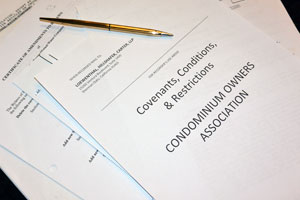LHC Newsletter Vol. 5, No. 2
“Updating the Association’s Governing Documents: Amending vs. Restating and Everything in Between”
By David A. Loewenthal, Esq.
As Association governing documents, i.e. Covenants, Conditions and Restrictions and Bylaws age, such documents become increasingly antiquated as the statutory laws that govern Common Interest Developments change. Thus, Boards of Directors are faced with the dilemma of determining whether or not the governing documents remain adequate and workable, or if the documents need to be restated or amended. Boards of Directors need to evaluate many issues in determining whether or not it is appropriate to restate or amend their documents. If the Board of Directors decides to proceed forward with such action, then they also need to decide how the documents should in fact be changed. The following article is designed as a primer on setting forth the distinctions between an amendment and a restatement; the types of provisions that may be included within the modified documents; reasons to take such action, etc.
What is the Difference between an Amendment and Restatement?
An amendment to the Declaration or Bylaws occurs when there is either one specific provision that requires modifications/change or, at most, only a few specific provisions.
A Restatement is an entirely new Declaration/Set of Bylaws which replaces the existing document. When is an Amendment Sufficient? (Pros):
- The Association’s Declaration/Bylaws are, for the most part, satisfactorily working and only one or a few provisions require modification.
- The limited number of amendments will allow the existing Restatement/Bylaws to remain largely intact.
- By simply adding a few limited amendments, the cost may be less than an entire Restatement of the Declaration/Bylaws.
- Limited amendments may be easier to explain to the membership and, as such, easier to obtain membership approval.
When is a Restatement Appropriate?
- The Declaration/Bylaws are older (approximately 15 years or more) and thus significantly out of date with the current statutes and case law.
- For older documents, incorporating only a few amendments will likely require future additional amendments or an entire Restatement anyway.
- By having Restated CC&Rs that are current with case law and statutes, confusion and inconsistencies between the Declaration and statutory law will be minimized.
- A Restatement may be far more cost effective than continuously adding amendments that will require ongoing use of the Association counsel, as well as multiple votes of the membership each time an amendment is being proposed.
- If the existing language is difficult to understand, a Restatement may be written in a more understandable manner.
Items that Are Typically Restated in CC&Rs:
Rental restrictions:
- Minimum rental period (generally not less than 6 months).
- Creating a maximum number of allowable rentals (FHA limits and insurance guidelines).
- Creating a protocol with respect to how rentals will be authorized by the Association, including lease provisions.
- Having renters subject to the Association’s governing documents.
- Assignment of rents in the event that an owner fails to pay assessments.
- Right of an Association to evict non-compliant tenants.
Collection policies:
- Including provisions that ensure that the Association’s collection policies and practices are compliant with the Civil Code.
Association maintenance responsibilities:
- Growing trend to attempt to limit Association’s maintenance, repair, restoration and replacement obligations.
- Trend toward minimizing Association liability for failure to maintain, repair/replace/restore common areas unless there is a finding of gross negligence or willful misconduct by the Board.
- Growing trend to attempt to transfer maintenance and repair responsibility for what was historically “common area” or exclusive use common area to individuals. Examples include: rooftops, patio/decks, stairwells that may only serve one upstairs unit, plumbing pipes that serve a specific unit, etc.
- Eliminating Association responsibility for any damage to the separate interest of a unit regardless of causation. Trend is to have the Association only responsible for damage to the “common area” and make the homeowners responsible for any interior damage or damage to personal content regardless of cause. (Such amendments may create potential unexpected liability to the Association especially when the Association is still ultimately responsible for the maintenance, repair, replacement and restoration of common area component parts and such component parts cause damage to separate interests). (Negligence vs. Contract Obligations)
- Adding provisions that allow the Association to have the discretion to repair an item that is the owner’s responsibility and then allow the Association to specially assess the owner for such costs including the right to lien and foreclose.
Gross negligence and willful misconduct standards: No liability for interior damage regardless of cause:
- Paint, floors, cabinets, etc.
- Mold
Making members responsible for Association insurance deductibles for claims involving their unit;
Architectural standards and procedures:
- Civil Code section 1378.
Creating reasonable Pet Restrictions pertaining to breed, size and numbers:
- Civil Code section 1360.5
A board may amend documents to create reasonable rules and regulations regarding the type, size and number (at least one) of pets allowed.
Creating specific Nuisance provisions including items such as hardwood surface flooring noise issues, smoking, etc.
- Trend toward expanding the Declaration of what may constitute a nuisance.
- Areas considered to be nuisance include unreasonable disturbances to sight, sound, smell or may be hazardous to the health of a member.
- Provisions pertaining to hardwood floors in multi- story condominium buildings.
- Specific provisions added into the Architectural Review Committee provisions pertaining to the types of flooring allowable as well as methodology of installation, acoustical testing requirements, etc.
- Expanded definitions of sound nuisances including dog barking, walking noise, stereo/radio decibel levels, parties, etc.
- Expanded definitions of nuisances related to odor including those that may migrate from one unit to another or into the common area.
- Amending documents to included no smoking amendments. This is a highly debated issue. General agreement that the Association can amend their documents to prohibit smoking in the common area as well as exclusive use common areas (patios, balconies and decks). The debate continues as to whether or not an Association can prohibit smoking in a separate interest unit.
Typical Amendments to Bylaws:
Creating staggered terms for directors:
- Corporations Code 7220(a): “The Bylaws may provide for staggering the terms of directors by dividing the total number of directors into groups of one or more directors.
- Staggered terms allow for ongoing continuity and preservation of Board experience and knowledge.
Election procedures, including deleting nominations from the floor:
- Civil Code section 1363.03(j) confirms that floor nominations are not required unless the governing documents so require.
Note: Even if floor nominations are allowed, ballots that have been previously turned in are not allowed to be recast.
Hearing standards/due process requirements prior to initiating discipline fines or suspension of privileges:
- Include provisions for due process hearings prior to any suspension of privileges.
- Civil Code section 1363(h): Ten (10) days notice of hearing. Board must notify member in writing within fifteen (15) days of their decision.
- Suspension of privileges are generally limited to items such as use of recreation room (except when the recreation room is used for Association meetings), tennis courts, swimming pools.
- Suspension of privileges may not include cutting off utilities such as electricity, gas, water or elevators.
- Suspension of privileges may not include denial of access to an owner’s unit or denial to a common area if it is required to gain access to the unit. In addition, suspension of privileges may not include denial of rights of parking to a member’s deeded space or exclusive use common area parking space.
Deleting cumulative voting:
- Cumulative voting is mandatory if authorized under the Association’s governing documents and there is more than one (1) open Board seat.
- Many Associations are choosing to delete cumulative voting so as to prevent a small group of homeowners from having disproportionate control of the Board.
Deleting use of proxies:
- Though proxies are still allowed they have become antiquated in light of the use of secret ballots.
- The use of proxies also does not guarantee that the proxy holder actually votes in the manner that the member intended when the proxy was provided.
Creating reduced quorum requirements:
- Oftentimes Association documents do not have reduced quorum requirements and, as such, membership meetings are often hard to hold.
- Reducing quorums from fifty-one (51) percent down to thirty-three (33) percent or even twenty- five (25) percent greatly increases the chances of having a membership meeting/annual elections of the Board.
Creating fair and appropriate qualifications to sit on the
Board of Directors:
- Membership as a prerequisite to serving on the Board
- Membership tied to ownership (including being a trustee of a trust or an officer of a corporation which holds title to the property will qualify).
- Being in good standing with the Association with regard to paying assessments.
- Not allowing more than one owner of a property to serve on the Board, i.e. eliminating having spouses serve on the Board contemporaneously.
Having documents that are relatively current and, most importantly, consistent with the statutory law will certainly allow the Association to run more efficiently and decrease confusion amongst the Board of Directors, members and property managers as to the proper governance of the Association.
©2011 by Loewenthal, Hillshafer & Carter, LLP. All rights reserved. Permission is granted to reproduce or transmit in any form any part of this newsletter as long as proper attribution to Loewenthal, Hillshafer & Carter, LLP is given. Due to the rapidly changing nature of the law, information contained in this publication may become outdated. As a result, lawyers and all others using this material must research original sources of authority.


